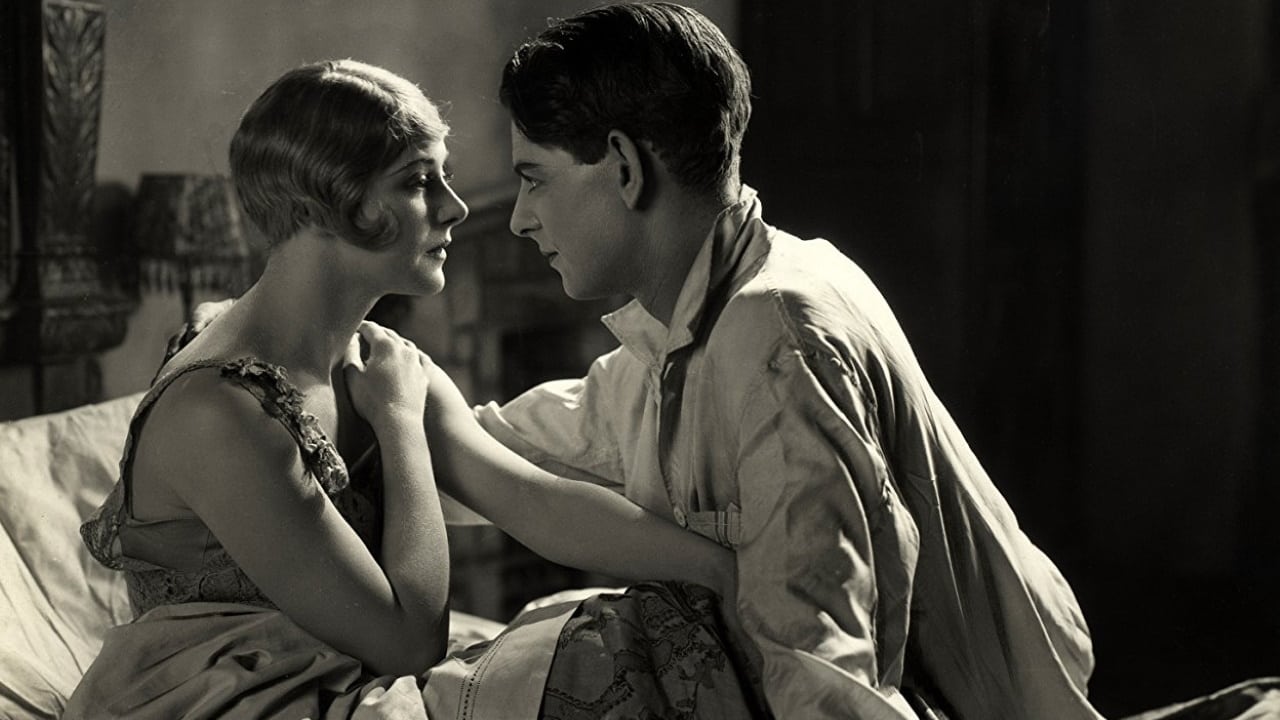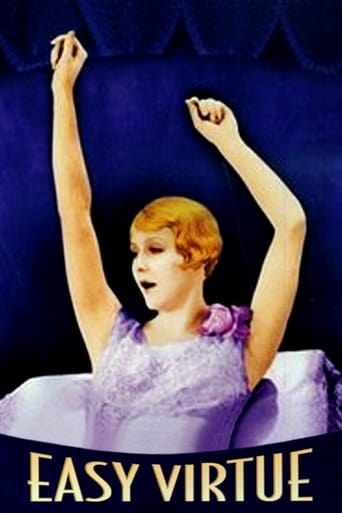

Disturbing yet enthralling
... View MoreSimple and well acted, it has tension enough to knot the stomach.
... View MoreI cannot think of one single thing that I would change about this film. The acting is incomparable, the directing deft, and the writing poignantly brilliant.
... View MoreThis is a coming of age storyline that you've seen in one form or another for decades. It takes a truly unique voice to make yet another one worth watching.
... View MoreIn Alfred Hitchcock's Easy Virtue, a woman has some explaining to do when the family of her second husband finds out there was a first husband. That's because back in the day, divorced women were considered damaged goods, and upstanding families would steer well clear of such flighty harlots. Easy Virtue's tagline asks "Can she be blamed for a past she didn't create?" And the answer is yes, because she did create her past when she started making eyes at the man painting her portrait. But perhaps I am getting a little ahead of myself.Larita Filton (Isabel Jeans) is married to an unnamed guy. Well, he probably has a name, but the movie doesn't tell us. Anyway, they're rich, and she's having her portrait done by a professional artist. One day the artist notices marks on Larita's wrist, and she mentions that her husband sometimes drinks too much. Thus a relationship is born, at least as far as they went in the 1920s, which meant it's possible Larita and the artist smooched once. Anyway, one fine day the husband comes home to find the two of them in an embrace. A gun is presented, and a shot is fired, and the artist dies. This is all told to us in flashback at the divorce trial, where the jury quite naturally finds in favor of the husband. Larita is shamed and shunned.She finds herself chillaxing on the Mediterranean, and a chance encounter with a tennis ball leads Larita to meet John Whittaker (Robin Irvine), who's from a well-to-do family himself. They romance, yadda yadda, and soon they're wed. He brings her home to meet his parents and his two sisters for dinner. The stern matriarch is fairly sure she recognizes Larita, and eventually she pieces it together. Haughty hilarity ensues.This is a silent film, obviously very early in The Master's career, and much more of a melodrama than a thriller with a twist. There's no twist, and because there are few sight gags one must rely on the intermittent title cards to follow the mouthed dialog. That's all well and good, but there was just too much predictability afoot, and the quality of the print did the movie no favors, either. That all makes Easy Virtue a curio in Hitch's long, long career, and little more.
... View MoreI dosed off. There wasn't really anything in the first hour. You can skip to the last 30 minutes and get all this movie has to offer. Even then, there's not much there. Good dialog may have made something out of this mess but there wasn't any, being a silent film. I found myself sitting there wondering what was being said but there weren't any cards to tell me. I guess I was supposed to get something out of the expressions but I couldn't. Most of the cards were at the end and by then I didn't care what was being said.Apparently some woman got divorced because she got her portrait painted by some artist who disappeared after shooting her husband....or something. She's miserable with her new husband, on her new estate because the mother-in-law doesn't like her or something. Does her new hubby like her or not? Don't ask me. He doesn't seem to care either way. And neither do I.A big fat who cares to this one. 2 stars because I know there's something worse out there.
... View MoreEasy Virtue (1928) ** (out of 4) Isabel Jeans plays Larita Filton, a woman who is abused by her drunken husband who thinks she is having an affair with a painter. When the husband confronts them the painter kills himself and soon the wife's reputation is tarnished in a divorce court. She flies off to France where she falls in love with a man (Robin Irvine) but soon his family learns of her past. This is a pretty tame and rather lame silent from Hitchcock and it's only real asset is those wanting to seek out the director's early work. The word melodrama is written all over this thing but there really isn't too many original ideas in its screenplay. The most interesting scenes are the early ones in the court where Hitchcock brings some nice style to the film when we get the various flashbacks, which then cut back to the court. The scenes involving Jeans and Irvine falling in love are all overly dramatic and the stuff with his mother come off fairly weak. Jeans is pretty good in her role but she really isn't given too much to work with. I found Irvine to be rather bland throughout the film as was the rest of the supporting cast. This type of melodrama ran ramped throughout the silent era and if it weren't for Hitchcock's name being attached, this one here would certainly be forgotten.
... View MoreThroughout the 1920s and the early 1930s, it's obvious that the Master of Suspense was still finding his feet. 'The Lodger (1927)' was Hitchcock's first sign of future promise, a truly effective silent thriller, and many of the film-making techniques he experimented with would later form an integral part of his many masterpieces. We are all aware, of course, that the director's specialty always lay in suspense, coupled with his audacious brand of dark humour. Perhaps, at this time, he was still unsure of which direction he wanted to head, or maybe he simply tried his hands at anything in order to maintain an income. Either way, 'Easy Virtue' his eighth film is a rare opportunity to see Hitchcock attempt a melodrama, and the results are interestingly mixed. The story was based on a Noel Coward play, a medium upon which the director would rely heavily for many of his later films.'Easy Virtue' starred British actress Isabel Jeans, who had previously appeared in Hitchcock's 'Downhill (1927)' and would later return in 'Suspicion (1941).'The story concerns a young lady named Larita Filton (Isabel Jeans), who had experienced a difficult and much-publicised divorce when her infidelity with an artist led to her husband being wounded and the artist's suicide. Frustrated by the constant pursual of photographers, Larita takes a peaceful holiday to France, where she meets a kind and gentle man named John Whittaker (Robin Irvine), whom she soon marries, much to the surprise of the man's family. While John's father (Frank Elliott) and his former sweetheart Sarah (Enid Stamp-Taylor) do their best to accept this new addition to the family, John's stern and suspicious mother (Violet Farebrother) does her best to destroy their relationship. The acting all-round is quite good, particularly Farebrother, whose character immediately evokes an intense feeling of dislike. Jeans is something of a two-sided character; we understand her plight for happiness, and yet she's got such a sense of arrogance about her that we're much more sympathetic towards her conflicted husband.At just 60 minutes in length, 'Easy Virtue' outstays its welcome by a good quarter of an hour. The centre section of the film drags on without really going anywhere, but is partially made up for by an interesting beginning and end. The court trial in the film's opening was quite brilliant, with Hitchcock displaying the technical imagination that would ultimately make him great. His use of match cuts to lead into the flashbacks such as the judge's swinging spectacles and the grandfather clock, and the focus on the drinks pitcher demonstrate a keen eye for the editing technique, and I would have been happier had more of the film been dedicated exclusively to the trial. The ending is also noteworthy, with the film denying us the usual happy ending, offering us a full serving of bitter pessimism; Larita emerges from the court room, completely beaten, and accepts that her life will never be the same again.
... View More